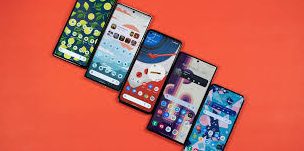The smartphone is always improving, but there has not been any significant technological development for the devices in many years. Since the first phones appeared on shelves the idea has evolved slowly. Cameras have gotten better, the chips that power phones have become more powerful, and the screens have become high-definition. In the next few years, that will change. What will a smartphone be like in the year 2030 and beyond? Let’s take a look at the latest smartphone tech that will change the phone forever.
Folding Phones For The Win
The future of the phone is folding. The first folding phones are already available, but these are more of a novelty than the norm. Over the next decade, the technology that underpins this feature is going to improve and become cheaper. Even entry-level phones will be folding in the next five years. This is a huge feature, with many potential applications for users and software.
The tablet device fell out of favor, with fewer and fewer sold every year. Folding phones are the best of both worlds, and give users the functionality and convenience of phones with the potential of a tablet. Folding phones are easier to fit in your pocket, easier to stand on their own for teleconferencing and filming, and allow split screen use. Not only are these phones going to be popular with consumers, but they are also going to become a lot more popular with software developers and game designers too.
Early adopters of this tech quickly become folding phone evangelists. The advantages are self-evident. Users find them perfect for both filming and viewing videos, and for playing games. People who enjoy free spins at PlayLive Casino enjoy a richer and more immersive experience with a folding screen. The live casino gaming at Play Live also looks better, with a larger and clearer picture than you would experience on a smaller handset and screen.
Hidden Cameras
One of the most defining features of a smartphone is the camera. Not just at the back, but also the front-facing selfie camera that makes apps like Instagram possible. Manufacturers have struggled to find ways to make smartphones smaller and more compact while still featuring two, three, or four lenses across the surfaces of the device. Now, the biggest phone manufacturers are looking for ways to hide the cameras for a sleeker device with an unblemished screen.
Notches, punch holes, shark fins, and teardrops have all been used by the biggest phone makers to try and creep the front-facing camera into the screen space without disrupting the user experience. All attempts have failed. The front camera on your smartphone is one of its most important elements, but it is intrusive. Hidden cameras beneath the screen will be the norm for smartphones by the end of the decade.
This has already been attempted by some manufacturers, but it often led to glitches on the screen and poor-quality pictures. These early hidden cameras were a statement of intent, however. The technology is being perfected and will begin to appear on mainstream phones, including the top-of-the-range Samsungs and iPhones in the next few years. From there they will slowly work their way down to the entry-level price point as the technology gets cheaper. The cameras at the back will disappear too, sitting quietly underneath the shell of the phone, giving them a sleek and monolithic look.
No Ports, No Problems
Phones are often thought of as wireless devices, but this is not the case. Every day we connect them to wires for charging or for listening to music. You can do both wirelessly already, but the ports are still there on the phone to let you plug them in when you need to. This will change in the next few years and the smartphones of the 2030s will be smooth electronic pebbles with no discernable way to connect them to, well, anything.
Wireless charging is currently a top-tier phone function. You will have to pay a premium price to experience the convenience of reliable wireless charging. The function is going to become cheaper, and the devices that charge phones without the need for a USB cable will match this price drop. This tech will be in everyone’s pocket before the decade ends, and that will signal the beginning of the end for ports on a phone.
This is going to change many public spaces too. Wireless charging can be built into tables, seats, window sills, and anywhere else you can think of. In the near future, charging your phone throughout the day will be as simple as putting it down on the coffee table in front of you whether you are at home or a Starbucks. The future of the smartphone is a device that can be charged anywhere and everywhere.
VR Phones And Holographic Displays
Once smartphones have become foldable, what next? Manufacturers are already looking for ways to implement virtual and augmented reality features into smartphones. This will probably involve a second device like Google Glass which appeared in the early 2010s before disappearing. In the coming decade, you may only need a wearable device to communicate, watch videos, and be directed around a city while your smartphone stays snug and safe in your pocket.
The space age trope of holographic displays is closer than you may think too. New materials are leading to huge advances in display technology, and the demand for newer phones with new features is fueling their development. Researchers at Queen’s University in Canada developed a screen called HoloFlex, which is not only capable of holographic display but can also be bent and folded. This is the perfect solution for all the phone manufacturer’s problems, and will likely become the phone screen of the future.
Holographic screens will project a three-dimensional image from your phone, and motion capture cameras hidden under the surface of the screen will track your interactions with it. This will change the way we talk on the phones, watch videos, and most importantly play games. The smartphone of the future will be unrecognizable compared to today’s devices.
The device that sits in your pocket or rests in the palm of your hand today will soon become antiquated. Developments that will change the smartphone forever are just around the corner.






